What City Winery Does for the Fashion District — and Vice Versa
What's a concert venue doing in a shopping mall? City Winery's Michael Dorf asked himself that question. He's pleased with the answer so far.
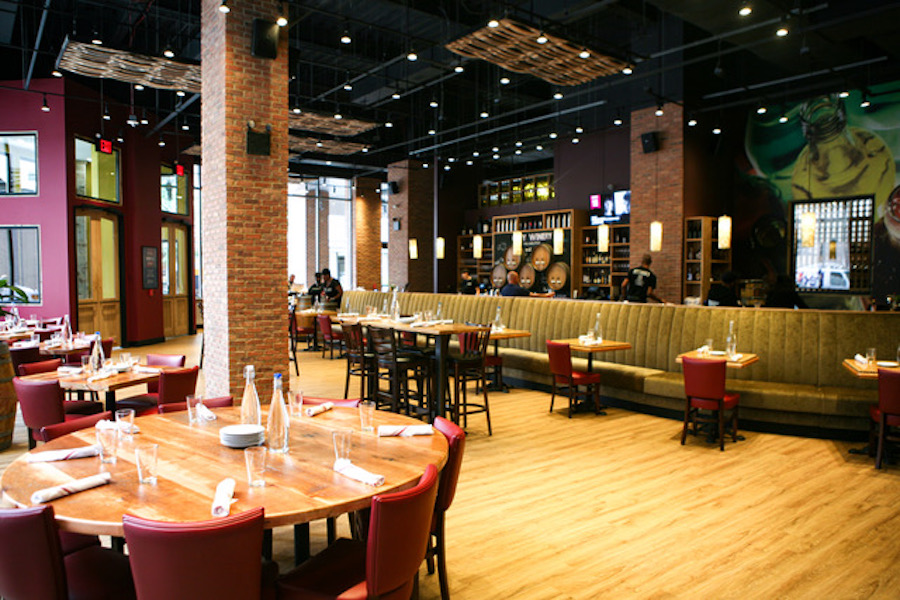
The main restaurant space at City Winery. | Photos: City Winery unless otherwise noted
Concert promoter, music producer and oenophile Michael Dorf, the founder of City Winery, doesn’t hang out at the mall.
But when he finally decided the time was right to bring his mélange of concert venue, function space, restaurant and winery to the City of Brotherly Love, the mall is exactly where he wound up.
Call it a marriage of convenience, but City Winery had something the owners of Fashion District Philadelphia wanted, and Fashion District had something City Winery wanted too.
One of the main goals PREIT/Macerich had with their Fashion District makeover was reanimating the streets that bracket the former Gallery mall. Filbert Street presented the bigger challenge because much of it is blocked off by other uses, such as the entrances and atrium for Jefferson Station.
But there was one piece of prime real estate that could be opened up to Filbert: the street-floor space at the southeast corner of the intersection with 10th Street. City Winery was looking for a 30,000-square-foot space in which to build its latest restaurant/music hall/function space. It found that at 10th and Filbert.
PREIT got the street-activating anchor it wanted for its mall, and City Winery got its big venue space. And both got what they wanted by largely facing away from each other.
Another visitor drawn to the Reading Terminal Market
For his part, Dorf was looking for a large chunk of real estate in a location close to a culinary destination. Most of the other six City Winery locations now in business are located either in warehouse or light industrial districts, as in Nashville and Washington, or near historic public or wholesale food markets: Ponce de Leon Market in Atlanta, Randolph Street Market in Chicago, Haymarket in Boston, and Chelsea Market, close to the new City Winery New York City flagship set to open next year.
Which led Dorf to zero in on one spot in particular in Philadelphia.
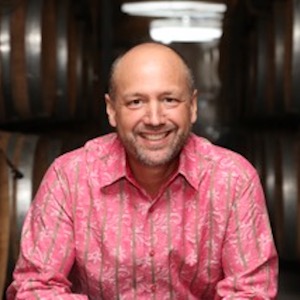
Michael Dorf
“When we were looking at [a place to locate in] Philly, I did draw about a one-mile radius around the Reading Terminal Market,” Dorf says. “I love that market. I think it’s such a great culinary location.
“And I also heard about it from my friends who are locals, and they just love the market. And when I walked through there, I’m like, This is really cool. This is authentic. This is not like Chelsea Market in New York, which is a wannabe, created market. This is the real deal.”
But would this work in a mall?
So thus primed, Dorf was at least open to the idea of locating in the Fashion District. But he wasn’t completely sold yet.
“I was hesitant at first about being in a mall,” he says. “When I took the tour, it was a ghost mall. I told some friends, ‘I’m looking at The Gallery,’ and they’re like, ‘Aaaaaughhh.’
“But 90 percent of our customers are not ever going through the mall to come to our front doors.”
And the fact is, you can’t enter City Winery from the inside of the mall. Its barrel room faces the mall’s train-level concourse, and the only doors from the concourse are emergency exits. To get to the barrel room, the concert venues and the restaurant, you have to use the outside entrance on Filbert Street.
But there is that 10 percent. They’re the ones grabbing seats at City Winery’s mall-facing bar, which is separate from the other spaces and totally open to passers-by in the mall.
That feature Dorf had to be sold on: “I was a little gun-shy of having a mall bar,” he says. “We’re not used to it. We never had one.” (Which should be no surprise, since the other locations are all in freestanding buildings.) His original design had the barrel room taking up the entire mall side of the lower level; there it would serve as both an advertisement for the winery to mall-goers and as sound and climate-control insulation for the concert venue on its other side.
“But all the real estate people we spoke to were like, Why don’t you have a presence in the mall?”
So in the bar went, and it’s proved to be a draw in its own right. “We’ve had more business than we anticipated at that bar,” says Dorf.
Looking to light up Filbert Street
But the main reason that PREIT/Macerich wanted City Winery as a tenant was to give the mall an experiential destination retail space to go along with the movie theater and entertainment complex planned for its top floor — but one that would enliven the street as well, which City Winery does with its streetside outdoor seating.
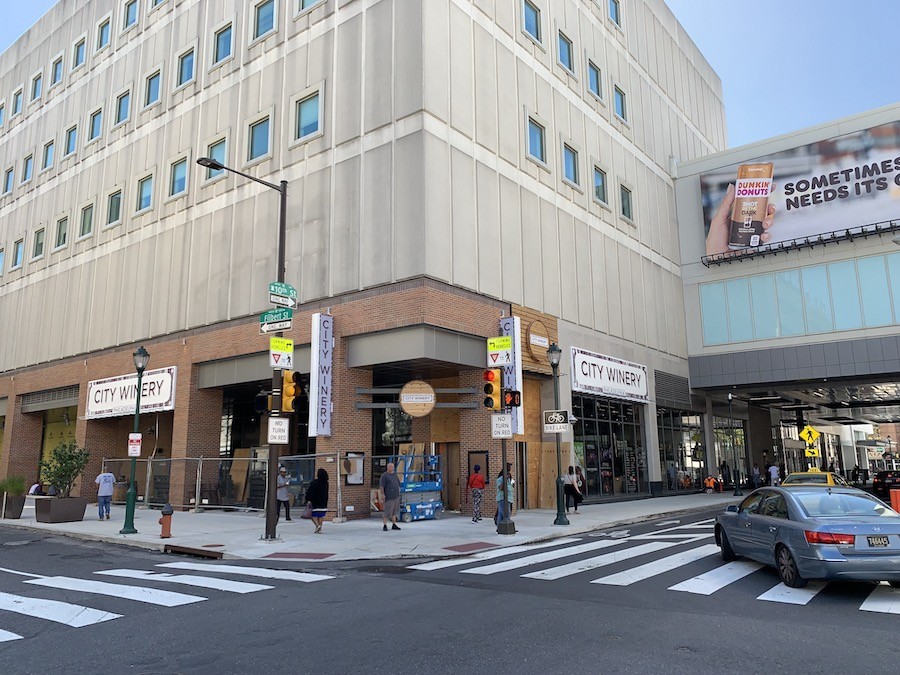
The entrance to City Winery at 10th and Filbert, a few weeks before its late-October opening. | Photo: Sandy Smith
City Winery’s two-level space in the Fashion District is designed to handle multiple functions at the same time. It has two concert rooms — the 300-seat main one downstairs and a more intimate one that seats 75 upstairs. It has a small private dining room that can host small-to-medium meetings, networking events and other social functions. Even the winery’s barrel room can host private dinners and functions. And it has a huge main restaurant space, which can also be reserved for private events like parties and weddings.
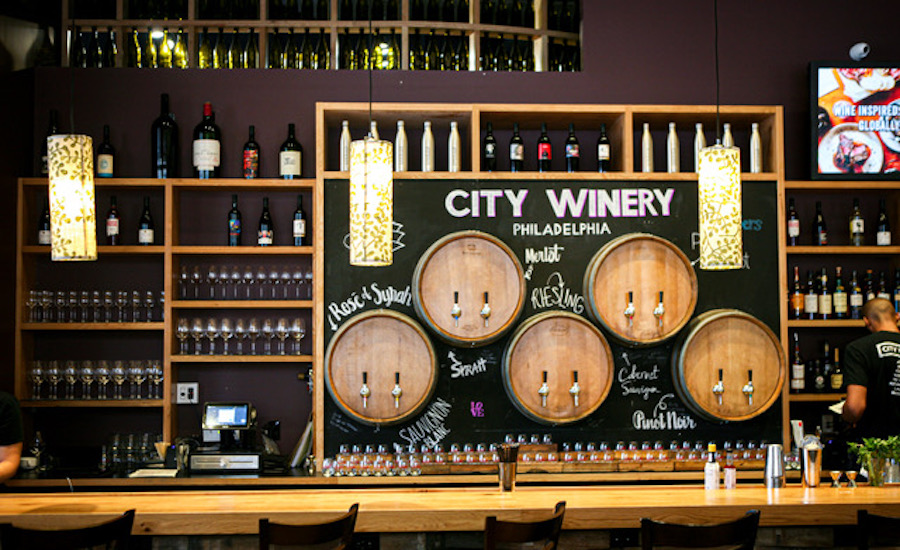
Detail of the main bar, including lamps designed by Galbraith & Paul and found in every City Winery location.
The design City Winery’s Brooklyn-based architect produced is decidedly casual and contemporary, and it draws on the trappings of winemaking extensively. Reclaimed barrel staves — “I think these days, if you don’t use reclaimed wood, there’s something wrong with you,” says Dorf — form woven panels that help dampen sound in the live main spaces, and brick and more reclaimed wood dominate the interiors. A giant wall of wine bottles encircles the staircase connecting the two levels. And the lamps that hang over the main bar, also a common City Winery design element, come from Philadelphia design and decor studio Galbraith & Paul.
It took a while, but he finally got here
Dorf had Philadelphia in his sights from the day he opened the first City Winery in New York. But before he opened here, he says, “I wanted to prove to myself and to our investors that we could create a chain. Philly seemed too close.” So the second City Winery opened in Chicago, then an opportunity presented itself in Nashville and he opened one there. Locations in Atlanta, Boston and Washington followed, at which point he decided the time was right to come to Philly.
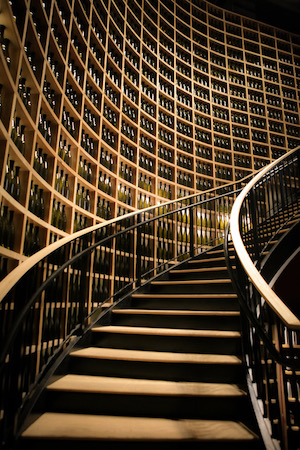
The wall of wine bottles that frames the staircase from the restaurant above to the concert venue below.
And even though City Winery had hired PR and advertising firms to do some pump-priming, the restaurant opened quietly on Oct. 21st. When I spoke with Dorf, City Winery had been open for a week and was preparing to host its first concert that night. However, Dorf said, “We have been very, very pleasantly surprised by how well the bar and restaurant have done without having any of our normal drivers.”
Which suggests that Philadelphia diners and music lovers alike are hungry and thirsty for something different in both their concert venues and their restaurants. But especially thirsty: “About 70 percent of our nightly beverage sales is wine,” says Dorf. And by now, some of that wine should have been made on the premises, with grapes sourced from California predominantly.
From touring cities to running venues in 100 of them
A Milwaukee native who spent much of his youth in Kansas City, the 57-year-old Dorf started out touring roadhouses with a band his college roommates formed before landing in New York and establishing The Knitting Factory, a legendary indie-music showcase. After selling his interest in The Knitting Factory to investors in 2002, he launched a successful series of fundraising concerts at Carnegie Hall and started a Hebrew school for young children in New York before deciding that pairing winemaking and music-making would be a winning combination.
The first City Winery opened in New York in 2008, and the second in Chicago in 2012. The next four locations opened in fairly rapid succession over the next six years. The New York original closed earlier this year, to be replaced by a new flagship location on a Hudson River pier set to open in January. Going forward, Dorf aims to open a new City Winery every year. Detroit, Milwaukee, Denver and Pittsburgh are all high on his list of cities to open in soon. In addition, Dorf plans to open smaller versions of this concept in small to mid-sized cities around the country. “There are 80 to 100 cities in North America that could support this,” he says.
Which makes Philadelphia an early adopter, in addition to giving people who wouldn’t think of coming to the Fashion District a reason to come.


